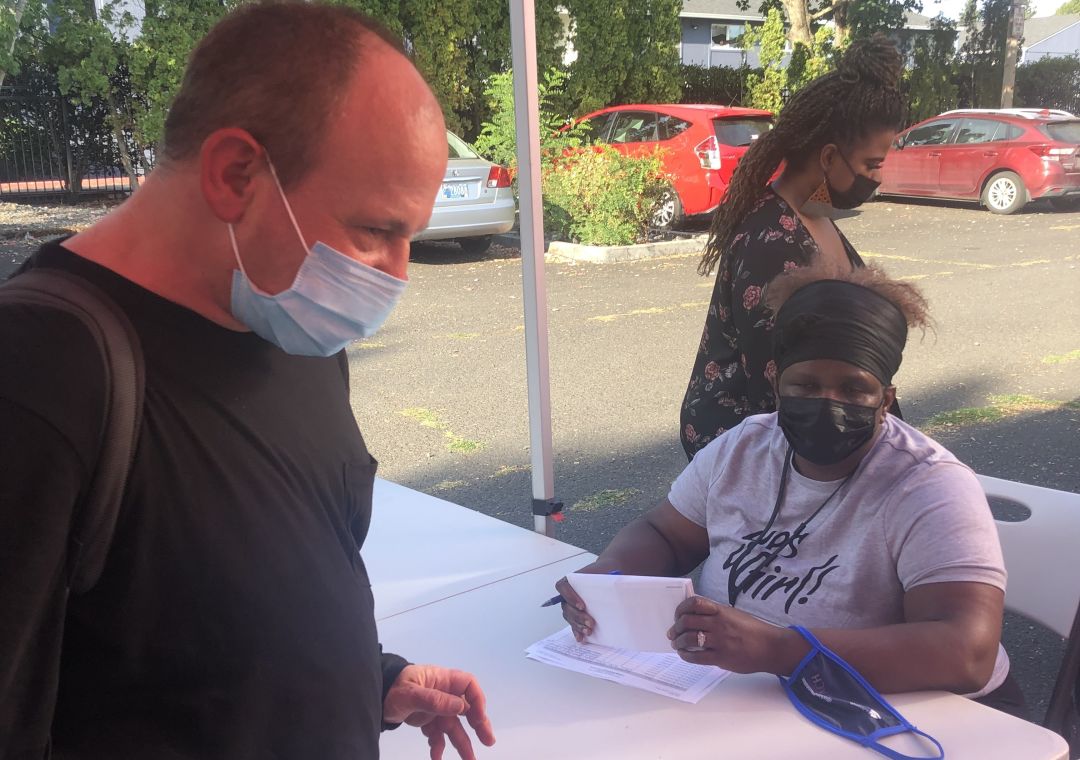In the Race to Vaccinate Oregon, Micro-Clinics Are Ground Zero

After getting his COVID vaccine, Marc Jacobs lines up for his $150 gift card, courtesy of Multnomah County.
On a recent sultry September afternoon at a farmer’s market in the Rockwood neighborhood of Gresham, you could buy a plastic baggie stuffed with late summer lettuce and tomatoes, dance atop the concrete parking lot to a DJ’s ear-splitting tunes and, while you were at it, get vaccinated against COVID-19.
The earliest days of the pandemic, which brought frantic rushes to secure a vaccine appointment at mass clinics at the Oregon Convention Center or the Portland International Airport—often resulting in hours-long lines—are long gone.
These days, the battle to vaccinate as many people as possible is less sprint, more marathon, where a set-up like the one at the My People’s Market here might result in just 25 people getting their shots over the course of three hours—each one of them a tiny but no less meaningful victory. There are clinics at the local McDonald’s during the lunch rush, in church parking lots on Sundays, and even mobile clinics going door-to-door in zip codes like this one, one of the most diverse and lowest vaccinated pockets in the Portland metropolitan area.
Rich Moss, a nurse with Medical Teams International, sat waiting for customers under a tent. He’s been administering vaccines almost daily since they first became available—at Walgreens, at the Clark County Fairgrounds mass clinics. When he began, he says, he wasn’t sure how long the assignment would last. Now there’s no real end in sight.
“Be good to yourself, and everyone else,” he says he tells people when he’s trying to talk through getting their shot—not too pushy, just sharing the facts.
Moss understands why some people have waited—he’s dealt with hesitancy even within his own immediate family—even as well-documented compassion fatigue rises among those who’ve been vaccinated for months. People sit down opposite him and tell him their vaccine stories, no two exactly the same.
Take Marc Jacobs, no relation to the designer of the same name, who got the Johnson and Johnson shot from Moss on September 9, after stumbling on the vaccine tent at the market. He knew, he said, that he’d waited “too long” to get the shot, but he’s homeless, and even the smallest details of his daily life are extra-complicated. For him, having the vaccine easily accessible at the market clinic made all the difference.
“There was never a moment, to make time for this, even though this is important,” Jacobs says. He’s heard all the arguments from conservative friends against getting vaccinated, and said he respectfully disagrees. Instead, he did his research, opting for the one-dose Johnson and Johnson shot, in hopes that he might be eventually able to follow it up with a booster shot of Pfizer, which early studies out of Israel and the United Kingdom have suggested create an especially strong immune response.
Besides the convenience factor, the other carrot for Jacobs and the others who trickled into the clinic at the market was the incentives offered by Multnomah County. Jacobs walked away with a $150 gift card, which he called “a blessing—that’s what pushed me over the threshold.” Sixteen-year-old Jerome Moss, a student at nearby Reynolds High School, got $100 for getting his first dose of the Pfizer vaccine and his sister got $50 just for bringing him in.
Moss said he was convinced it was time to get his shot after he saw his sister and her son get theirs and emerge unscathed, especially now that he's back in school full-time, navigating his way through crowded hallways.
“At first I was, like, scared, I’ll say,” he says. “I never knew anyone who had the vaccine. But she got it, and my nephew, and nothing happened to them. It kept them from getting COVID—no symptoms or anything. Maybe it will keep me like that too. My dad said he's going to get it too, now. He said, if I have it, why would he not?"
Having a personal connection to COVID-19 is a powerful motivator, and one that governments, no matter how well-intentioned, can’t engineer. Princess Churchwell, a single mother of two who lives in the Rockwood neighborhood said that she has a close family member who recently came down with COVID-19, which brought the danger of the disease home. Still, she was worried about scheduling the vaccine, given the chances of side effects and her childcare needs—but now, with her own kids finally back in school full-time, the time felt right. Her eldest is 12, she says, and now that’s she’s vaccinated, she’s thinking seriously about bringing in her daughter.
“I let her know, ‘Mommy’s going to get her shot,’” she says. “We’re talking about it. I think as a mom, you’re trying to protect yourself, so you can take care of someone else. I had to come to this in my own way.”
For others, it’s the fast-spreading Delta variant and news about bursting hospitals in Oregon that finally pushed them to get their shot. Speaking through a Spanish language translator, Hillsboro resident Pedro Jongitud said family members had been pressing him to get his vaccine. The Pfizer vaccine getting full approval from the FDA was the final push he needed, he says, “so I don’t get really sick, or get anyone around me sick.”
The clinic at the Rockwood Thursday market will continue through October. For a full list of Multnomah County micro-clinics, click here.




